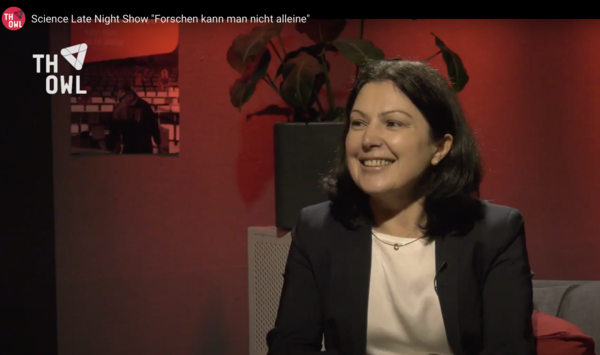The Ostwestfalen-Lippe University of Applied Sciences and Arts has a special reason to celebrate this year: it is celebrating its 50th anniversary. As part of this, there are some exciting events this year under the slogan of the campaign "You can't kiss alone", most of which are available online due to the Corona pandemic.
On April 01, the first anniversary highlight of the year took place: The Science Late Night Show, to which the Institute for Industrial Information Technology (inIT) was also invited. Because not only can you not kiss alone, you also can't do research alone. The media project was set up by students under the direction of Professor Kathrin Lemme, Vice President for Communications. The show was moderated by 1Live presenter and Lemgo native Freddie Schürheck, who interviewed Professor Helen Dörksen, a member of the inIT board, about her recent research projects.
What do chicken eggs have to do with mathematics and computer science? Professor Dörksen was able to answer that. She devotes her research to a particularly important topic for society and animal and environmental protection. With her research, she is helping to prevent the mass killing of male chicks. In cooperation with Coburg University of Applied Sciences, she has developed a minimally invasive method to determine the sex of chicks before they hatch. "In the egg, different biological structures develop in male and female chicks. These are illuminated with a laser through a tiny hole in the egg shell. The light they emit can be used to determine the sex of the embryo in the egg. In science, this method is called fluorescence spectroscopy," explains Professor Dörksen. She has succeeded in deriving a precise and robust system from the measured values that distinguishes male chicks from female ones. What makes it special is that it already works with three to six-day-old chicken eggs. The embryo in the egg cannot yet feel pain at this stage. "I am a passionate mathematician. And pursuing the question of whether it might be possible to identify genders behind an accumulation of data was a great challenge that I was happy to take on. Knowing that I could potentially help animal welfare with my mathematical knowledge was the biggest motivation," Dörksen says.
In addition to Professor Helene Dörksen, Professor Johannes Üpping and Professor Guido Falkemeier from TH OWL were also present. The band Logpod Magartom, consisting of four students from the Detmold University of Music, provided musical entertainment for the evening. You can watch the whole show again here: https://youtu.be/Ny5pDd4Faxk


